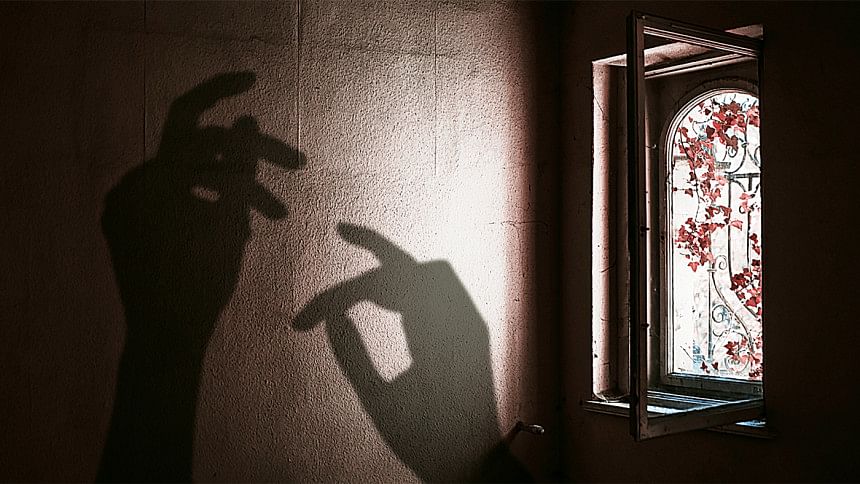Home for rent

BDT 80,000/3200 ft2 — Two-storey building built during the late 1970s with three baths, two verandas, and two garages @ Dhanmondi 33 (also known as Lost Property Lane), Dhaka.
Welcome to this partially furnished two-storeyed house situated in a most coveted and family-oriented area in the city of Dhaka. The house is 46 years old and was built by the father of the current owner of the house who wants to remain anonymous (I'll call her Mrs X) at the moment. She inherited the house after a tragic accident killed her brother and his wife, who were childless. As you can understand, the building has always been a family home and very well kept. The three-bedroom house, two of them on the second floor and one on the ground floor, can be your dream home provided that you treat your son and daughter equally.
The house boasts many antique pieces of furniture painstakingly curated by the previous owners. The master bedroom with attached bathroom sports a queen-size bed, which replaces the original four-postered one with curtains. The change was made by Mrs X's sister-in-law Tara, who found the Victorian bed to be suffocating. But you will find the original wooden side tables, wardrobe, two small wooden chairs, and a small bookcase still intact. An old built-in closet in the room has recently been blocked by Mrs X as it evokes bad memories of her childhood. She was often locked inside it by her mother for playing truant. You would not want to imagine those ugly, dark things when visiting a lovely house as this, would you? The attached bathroom is spacious with a soaking tub of crimson hue and white marble slabs for the floor. It was decorated according to the wishes of Mrs X's mother. She had studied interior design even though she never worked professionally since her husband, whose family claims ties to the Nawab family, did not approve of women working outside the home. The veranda attached to the master bedroom is replete with hanging plants and pots of English Ivy and Chinese Evergreen. These were favourites of Tara and even though I never met her, I understand that the colorful evergreens reflect her boisterous personality.
The other upstairs bedroom was originally designed to be a boy's bedroom, for a boy who had special interest in music. Two guitars, bass and electric, still hang on the wall. The furniture consists of a twin bed with an upholstered headboard, a reading table, and a chair. While the table in the corner is nondescript, the comfortable chair in front of it is clearly a gaming chair. Mrs X says this was added later because there were no computers when she and her brother were growing up. She also says that their parents would give him anything he desired, probably the reason why the relationship between the siblings was strained. While he played guitars, she cleaned the fridge. The way the parents of Bangladesh discriminate between their sons and daughters, it creates a master-slave dynamic right at home. But what can you expect from a system that allows a girl child to have only half of the property inherited by a boy? The daughters are outsiders from the beginning—to be uprooted from the parents' house to be installed elsewhere. For many it becomes a trauma of homelessness that haunts them for the rest of their lives.
The attached bathroom in this room is smaller than the master bedroom's, but well designed. When Ashraf was a little boy, it had tiles designed like a Ludo game board, but upon her return from the hostel one summer, Mrs X saw that they had changed to "manly colours" of dark green and grey because he was growing up. There is no bathtub but a walk-in shower stall with glass panels. This bathroom has a tall, narrow window that provides natural light. The bedroom also has an attached veranda. The view used to be spectacular, but the high-rise buildings have now blocked much of the view. This might remind you that nothing in life is all beautiful; consider also the darkness beneath the lamp.
The ground floor is the most spacious place as it houses the third bedroom and bathroom, along with a living room, drawing room, a large kitchen, and a dining room. According to Mrs X, the drawing room was rarely used when she was younger, opened only during festivities like Eid. Most of the ornate furniture was disposed of by Tara, who passed away before she could redecorate the place. Hence you are free to furnish this space as you wish.
The living room has nice, cosy sofas and divans along with woolen rugs and comforters. There are colourful cushions, which, again, are not part of the original furniture. These, too, were introduced by Tara. Mrs X remembers this room as a lion's den presided over by her father. The living room was the family TV room, but he always dictated what to watch, and where and how to sit.
The kitchen is an elaborate affair. The stove has six burners and was only recently installed by Tara. The place is quite airy with an exhaust fan, a microwave oven, cabinets, a fridge, and a freezer. But Mrs X says that most of these are Tara's doing. During her childhood, the place was much smaller, with little ventilation. Her mother had developed throat problems from spending extended hours in the kitchen.
The last room is the third bedroom that Mrs X inhabited during her time as the daughter of the house. You might be surprised because the room has no furniture whatsoever. Mrs X says that the furniture in her room were the old unwanted things. There were either too plain or too gaudy—a cot that originally belonged to her grandmother, a wardrobe from her mother's maiden days, and such like. Mrs X's parents were not interested in spending money on their daughter's room because they would have to give her new furniture when she got married. She also said, "I was disinherited by my own parents because I failed to live with their chosen groom." After a pause, she continued, "I think they were happy that they did not have to divide their property. But look at the way fate worked—the house ended up in my hands." I can understand why Mrs X feels no connection with the house she has inherited. It was never hers to begin with.
A double garage is right outside the main house beside the flower garden where bougainvillea and hydrangeas grow alongside red and pink roses. These are also changes made by Tara. Mrs X's father only allowed sweet-smelling white flowers like jasmine and night queens in the garden. Mrs X laughed and said that he believed women were like flowers—you can smell and enjoy them, but it is better to hide them from strangers. She says wistfully that she never really got to know Tara well. Her brother had married her against the wishes of his parents who were scandalised when their son chose to marry a Hindu girl. Eventually, they came round and accepted her, but they never forgave the daughter who finally found another life by marrying a man of a different culture and religion.
Notes to applicants: The rent is less than half of the regular house rent in the area. But the prospective tenant must fulfill the following:
Security Deposit: A full month's rent which will be adjusted at the end of the lease.
Lease term: June 1, 2025 – May 31, 2027.
Pets are encouraged as Mrs X was never allowed to have one as a child.
Prospective tenants with daughters will get preference.
In case the prospective tenant has a son, at least two reference letters are required vouching for equal treatment of gender in the family.
Tenant responsible for Internet, electricity, and gas bills.
If you would like to view:
Please EMAIL to the address below to schedule viewings (no calls or texts). Also please send some details about yourself. The owner of the house would definitely like to know more about the prospective tenant of her house.
Sohana Manzoor is a writer, translator and academic from Bangladesh, with a PhD in English from Southern Illinois University Carbondale. Her work has appeared in Bellingham Review, Litro, Eclectica, SUSPECT, Best Asian Short Stories 2020 and elsewhere.

 For all latest news, follow The Daily Star's Google News channel.
For all latest news, follow The Daily Star's Google News channel. 



Comments